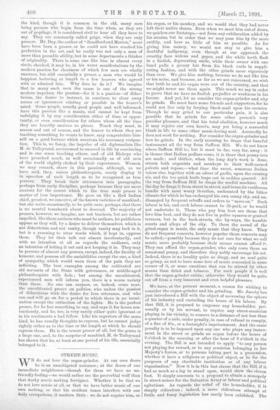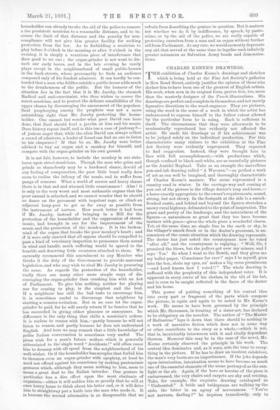STREET-MUSIC.
WE do not love the organ-grinder. At our own doors he is an unmitigated nuisance ; at the doors of our immediate neighbours—though for them we have no un- friendly feeling—we would rather see the proverbial wolf than that dusky music making foreigner. Whether it be that we do not love music at all, or that we have better music of our own making, or that his strident tones interfere with our daily occupations, it matters little : we do not require him, or
his organ, or his monkey, and we would that they had never left their native shores. Even when we meet him out of doors, we quicken our footsteps,—not from any exhilaration added by his strains, but in order that we may pass him by the more swiftly, and hear as little of him as possible. As for giving him money, we would not stay to give him a doubtful halfpenny, even though at our approach the swarthy face widens and gapes, and the white teeth flash in a foolish, deprecating smile, while their owner with one hand pulls a greasy bat from his black curls in suppli- cating fashion, and with the other grinds more vigorously than ever. We give him nothing, because we do not like him or his noise, and because, as far as we are concerned, we wish that both he and his organ were out of the country, and that we might never see them again. This much we say in order to prove that we have no foolish prejudice or weakness in his favour. And yet, let us consider the organ-grinder and why he grinds. He must have some friends and supporters, for ho could not live only by levying black-mail upon his enemies Though he may grind to our particular pain, it is also possible that he grinds for some other person's very peculiar pleasure, and that his total abolition, however much it may rejoice our own hearts, may yet bring a sorrowful blank in life to some other music-loving soul. Assuredly he does not work for nothing. For consider the organ-grinder and how he grinds. In the early morning he drags that baneful, instrument all the way from Saffron Hill. We do not know where Saffron Hill is; but it must be far, very far, away : it is thence that Italian pedlars come, it is there that penny-ices are made ; and thither, when the long day's work is done, return both organists and monkeys to theitc well-earned polenta and repose,—what time the sweet, sonorous Italian voices rise, together with an odour of garlic, upon the evening air, and the too quick knife leaps out in sudden quarrel. All the way from Saffron Hill he drags the woeful machine. All the day he drags it from street to street, and turns its vociferous handle with most weary iteration, undaunted by the bitter climate for which be has exchanged his own sunny sky, and un- dismayed by frequent rebuffs and orders to "move on." Such labour is his, and such labour cannot be ill-paid, or he would not undertake it. Those who pay him best are those that love him best, and they do not live in polite squares or genteel terraces, but in the back-streets, the by-ways, the humble courts and alleys of the city. To them the sound of the grind-organ is music, the only music that they know. They do not frequent concerts, however popular those concerts may be called,—possibly because they do not care for what we call music, more probably because their means cannot afford i+. They can afford the organ-grinder, who only costs them an occasional penny, and therefore they nobly encourage his art. Indeed, there is no locality quite so dingy, and no soul quite so grimy, as not to have some love of music concealed in some corner of it, or some emotions that can be stirred by other means than drink and tobacco. For such people it is well that the organ-grinder exists ; otherwise they would be quite cut off from a very innocent and even helpful pleasure.
We have, at the present moment, a reason for wishing to consider the organ-grinder and his grinding. Mr. Jacoby has just introduced a Bill with the object of narrowing the sphere of his industry and curtailing the hours of his labour. By that Bill, it is proposed to empower any householder, per- sonally or by his servant, to require any street-musician playing in his vicinity, to remove to a distance of not less than a quarter of a mile, under penalty, in case of refusal to comply, of a fine of 40s., or a fortnight's imprisonment. And the same penalty is to be imposed upon any one who plays any instru- ment in the street or grinds an organ before the hours of 8 o'clock in the morning or after the hour of 8 o'clock in the evening. The Bill is not intended to apply "to any person not playing for reward, or to any musician belonging to her Majesty's forces, or to persons taking part in a procession, whether it have a religious or political object, or be for the purposes of any charitable institution . or of any labour organisation." Now it is in this last clause that the Bill, if it had as much as a leg to stand upon, would show the cloven foot. It simply amounts to a proposal to obtain a monopoly in street-noises for the Salvation Army or labour and political agitations. As regards the relief of the householder, it is simply ridiculous ; indeed, a more ridiculous attempt at futile and fussy legislation has rarely been exhibited. The
householder can already invoke the aid of the police to remove a too persistent musician to a reasonable distance, and to in- orease. the limit of that distance and the penalty for non- 'compliance will not give him greater facility for seeking protection from the law. As to forbidding a musician to play before 8 o'clock in the morning or after 8 o'clock in the evening, it is simply a vexatious piece of interference that does good to no one ; the organ-grinder is not wont to dis- turb our early hours, and in the late evening he rarely plays except in the neighbourhood of small public-houses in the back-streets, where presumably he finds an audience .composed only of his fondest admirers. It can hardly be con- tended that a man who fiddles outside a public-house adds much to the drunkenness of the public. But the humour of the situation lies in the fact that it is Mr. Jacoby, the staunch Radical and anti-coercionist, who thus wishes to coerce the street-musician, and to protect the delicate sensibilities of the upper classes by discouraging the amusement of the populace. 'Saul prophesying among the prophets was not a more -astonishing sight than Mr. Jacoby protecting the house- holder. One cannot but wonder what poor David can have -done, that Saul should hurl a javelin at him and his music. Does history repeat itself, and is this too a case of jealousy P— of jealous anger that, while the alien David can always collect -a crowd of admirers, a leader of Israel can find no one to listen to his eloquence ? If that be so, Mr. Jacoby were better advised to buy an organ and a monkey for himself, and oompete with the organ-grinder on his own ground.
lit is not fair, however, to include the monkey in our stric- tures upon street-musicians. Though the man who grins and grinds so shamelessly may be a hardened sinner, devoid of any feeling of compunction, the poor little beast really does seem to realise the infamy of the music, and to suffer from pangs of remorse. What a world of sorrow and heavy shame there is in that sad and wizened little countenance ! Alas ! it is only to the very worst and most asthmatic organs that the poor animal is attached, and we cannot wonder that he should so dance on the pavement with impotent rage, or climb an adjacent lamp-post to get as far away as possible from the instrument of torture. How much better it had been if Mr. Jacoby, instead of bringing in a Bill for the protection of the householder and the suppression of street- music, had brought in one for the improvement of the music and the protection of the monkey. It is the broken- wind of the organ that breaks the poor monkey's heart ; and if it were only enacted that all organs should be compelled to pass a kind of veterinary inspection to pronounce them sound in wind and handle, much suffering would be spared to the humble and deserving little creatures attached to them. We 'earnestly recommend this amendment to any Member who thinks it the duty of the Government to provide maternal legislation, and who may wish to rival Mr. Jacoby in procuring the same. As regards the protection of the householder, -really there are many other more simple ways of dis- couraging the organ-grinder than crushing him with an Act of Parliament. To give him nothing, neither for playing nor for ceasing to play, is the simplest and the best. If a neighbour has still the bad taste to encourage him, 'it is sometimes useful to discourage that neighbour by starting a counter-irritation. But in no case let the organ. grinder be paid, for he will surely return if he fancies that he bas succeeded in giving either pleasure or annoyance. In- difference is the only thing that chills a musician's ardour. It is useless to reason with him,—partly because he will not listen to reason, and partly because he does not understand English. And here we may remark that a little knowledge of polite Italian conversation is sometimes very useful The pious wish for a ran's future welfare which is generally abbreviated to the single word " Accidente !" will often cause him to decamp with all speed from the neighbourhood of his Yell-wisher. Or if the householder has scruples that forbid him to threaten even an organ-grinder with apoplexy, at least he need not offend against his conscience by making pantomimic gestures which, although they mean nothing to him, seem to 'mean a great deal to the Italian intruder. One gesture in particular has a dire effect upon the most obstinate of .organists,—either it will sadden him BO greatly that he will at -once hurry home to think about his latter end, or it will drive him to straightway put a knife into the man who made it. It is because the second alternative ie so disagreeable that we
refrain from describing the gesture in question. But it matters not whether we do it by indifference, by speech, by panto- mime, or by the aid of the police, we are really capable of protecting ourselves from a man and an organ without further aid from Parliament. At any rate, we would earnestly deprecate any aid that served at the same time to legalise such infinitely greater nuisances as Salvation Army bands and demonstra- tions.



































 Previous page
Previous page